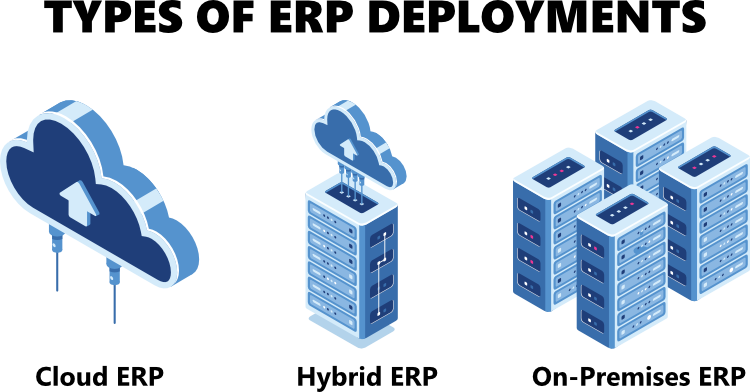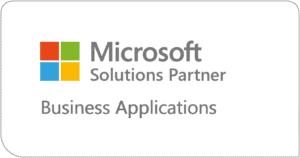What is ERP Deployment?
ERP or enterprise resource planning deployment is the process of ensuring that the ERP system is operationally acceptable. As part of ERP system deployment, on-site installation, check out, integration, and testing must be carried out to ensure that the system is fit to be deployed into the field and/or put into an operational context.
It includes all of the steps, processes, and activities that are required to make an ERP system or update available to its intended user.
Today, there are different ERP deployments with different ways to be implemented for the user. Each deployment requires different skills and works for different purposes. Therefore companies must carefully consider the right type of ERP deployment.
Such considerations for the deployment and use must be thoroughly planned and analyzed by all parties that are included during the project.
Also, it is important to know that, not every ERP vendor provides all types of ERP deployments. Some might be specifically focusing only on one type of deployment.
Why is ERP Deployment Important?
ERP deployment is one of the most important aspects of any ERP project. The right ERP deployment will determine the way how you will maintain your ERP system and the pricing model of the ERP system.
Like I said, each type of ERP deployment has its pros and cons and you should carefully evaluate which one fits your needs and budget the most. We will discuss the pros and cons later.
However, it is always best to discuss your needs, requirements, and budget with your ERP vendors as they can suggest a more suitable option for you depending on your feedback.
Because while you might think that a certain type of ERP deployment might seem like the best fit, ERP vendors might suggest you a different one based on industry knowledge and experiences and your feedback.
3 Types of ERP Deployment
Today, you not only have to consider the right ERP vendor and then the right ERP partner of the vendor but also what deployment fits your company the most.
As I said, there are different variants of deployment options available depending on the ERP vendor you select. However as already mentioned, some may only focus on one, while others two to three.
So, to determine which ERP deployment is right for your organization, let me walk you through the three most common types of ERP deployment, their pros, and cons.
1. Cloud ERP
Cloud ERP or also called SaaS ERP is hosted and managed in an offsite server typically managed by your ERP vendor or hosting vendor if you rent the server. With Cloud ERP deployment, most heavy IT work is done for you, such as upgrading the system, keeping the system alive, and disaster recovery.
ERP systems in the cloud help companies to shift their focus towards their business rather than IT administration because everything is done for you. The automatic upgrades ensure you are always running on the latest version of the system having access to the latest technology.
Thus, this can give you an edge against your competitors as having access to new technology means better business outcomes and outpacing your competitors.
So let’s discuss some of the pros of the Cloud ERP deployment:
- Data security is in the hands of the vendor. This means ERP vendors like Microsoft provides enterprise-level security for each of their cloud ERP system.
- Offer great stability and continuous updates from the vendor because of less customization.
- Organizations can work with vendors to see what changes can be made.
- Typically, less time to implement and a faster time to go live with the system.
- Predictable costs over time that can be changed based on your requirements.
So, these are the typical benefits of having a cloud ERP system.
On the other side, many organization requires some level of customization to their system whether it is only part of the module or entire concept to fit their business processes.
And while Cloud ERP systems can be customized to user needs and in many cases they will need to be, however, this brings other challenges to the project.
As we discussed, Cloud ERP systems are being continuously updated. Of course, you can choose when you want to update your system, however, at least once or twice a year ERP vendors provide big updates to their system that are mandatory.
This means you will need to update your system once every year or six months which could impact your customization and you will need to bring regularly your vendor to update your customization or having in-house experts. In both cases, this adds up to the cost of owning Cloud ERP.
Therefore, here are some of the Cons of having an ERP system in the cloud:
- May end up spending more money throughout the system life cycle.
- Data security is in the hands of the vendor. Some organizations may not find it suitable.
- Less customizable in general because of the continuous upgrades
- If you are having customization, you might need to continuously update those as new system update might break those customizations.
2. On-Premises ERP
The second type of ERP deployment is on-premise ERP.
An On-premises ERP system is a solution that is control and managed by your own IT infrastructure. This generally gives your company more room to customize your solution as per your needs. This is especially important to companies in specialized industries like certain types of manufacturing to manage their unique processes.
Many organizations find ERP solutions on-premises more suitable as on-premise ERPs put more control in the hands of the organization, up to and including the security of its data.
However, this can limit access to the server, and technologies like mobile ERP can pose an issue for on-premises deployments. These often require a third-party client to communicate between a mobile device and the on-premises software.
So here are some of the Pros of having an On-premises ERP system:
- Reduce the initial price of the system
- Data security is in the hands of the organization
- Greater ability to customize
- The organization has more control over the implementation process
And here are some of the Cons of having an On-premises ERP system:
- Upfront investment can be seen as riskier
- Data security is in the hands of the organization. Due to high governance and security protocol, some organizations may not have the resources
- The implementation process can take significantly longer
3. Hybrid ERP
The third type of ERP deployment is Hybrid ERP.
Hybrid ERP is a combination of both Cloud and On-Premises ERP systems. Many organizations especially large companies use on-premises ERP that at some point will require further investment to keep up with current requirements and growing business.
Therefore, companies integrate cloud ERP solutions to further extend their ERP capabilities like eCommerce, CRM, collaboration tools, and others.
This bi-modal strategy also presents the least amount of risk because the known core, on-premise ERP can be trusted to work reliably while the cloud can be used to add specific, limited functionality one project at a time to avoid major problems, delays, and unacceptable additional cost.
And while cloud ERP solution could be a viable solution for such companies having hybrid ERP can bring many benefits. Unlike cloud ERP, a hybrid combines the options to have certain modules integrated with on-premises solutions that allow companies to customize the module as they need.
Also, the benefit of a hybrid solution is you can protect your past investment in ERP. Rather than moving your whole ERP solution into a cloud, you can start slowly with one new module and then moving and upgrading your previously purchased ERP modules.
Like this, you will not have to invest in an entirely new ERP but rather slowly replacing the old one.
So here are some hybrid ERP benefits:
- The flexibility of choosing where data will be stored whether on cloud (more secure) or on-premises
- the organization’s workload is contained within a private cloud while retaining the ability to spontaneously increase their workload and perform the spikes of usage on the public cloud.
- Cost-effective as organizations pay for the public cloud portion of their infrastructure only when it is needed.
- Get a centralized private infrastructure on-premises.
- Workloads get on-premise computational efficiency which ensures maximum workload management.
And here are some of the Cons of having a Hybrid ERP system:
- The initial deploying cost of a hybrid cloud is high
- Some organizations don’t prefer to store data at an off-site location, and that will make the hybrid cloud environment inaccessible to public clouds
- If not picked correctly, cloud compatibility can become a real nuisance for Hybrid Cloud environments
- A fast-performing on-premises infrastructure may not be able to successfully perform in coherence with a slow-performing public infrastructure resulting in a sluggish performance of the Hybrid Cloud.









